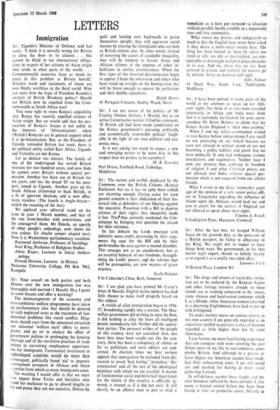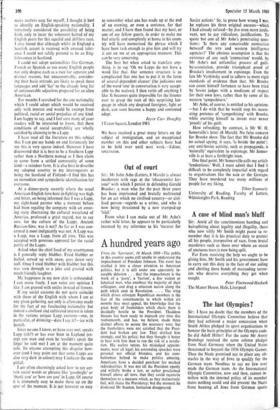Sir: The slings and arrows of racial discrimina- tion yet
to be endured by the Kenyan Asians and other foreign intruders already on these islands are as nothing compared to the sneers, stony silences and hard-voiced contempt which I, as a blonde, white American woman (married to a charming Englishman), have had to put up with in England.
To make matters worse on various returns to my own country I am generally regarded as an expatriate (spelled ex-patriot). a class of humans regarded as little higher than lice by most Americans.
I can foresee no more humiliating experience that can compare with mine covering the past fifteen years of my life in race-conscious xeno- phobic Britain. And although to a greater or lesser degree my American accents have modi- fied their unbecoming tones. I am still nosed out and marked for baiting at most social gatherings I attend.
In self-defence against these tirades and the utter boredom inflicted by these attitudes I, like many a hunted animal before me, have been forced to take on protective cover. Initially to make matters easy for myself, I thought it best to identify an English-speaking nationality. I tentatively considered the possibility of being Irish, only to incur the vehement hatred of my English peers for this squalid and shiftless race. I also found that although whilst in England a Scottish accent is received with amused toler- ance I could not safely pretend to be an Eng- lishwoman in Scotland.
I could not adopt nationalities like German, French or Spanish as too many English people not only despise each as a race for separate and distinct reasons, but unaccountably, consider- ing their basic attitude, are likely to speak these languages and add 'liar' to the already long list of unfavourable adjectives prepared for an alien American.
For months I searched for the one nationality which I could adopt which would be received only with interest and would be exempt from political, racial or social prejudice of any kind. I am happy to say, and I feel sure many of your readers will be interested to know, that these conditions of social acceptability are wholly satisfied by claiming to be a Lapp.
I have read all the literature on this subject that I can put my hands on and fortunately for me this is very sparse indeed. However I have discovered that it is best to be a Southern Lapp rather than a Northern nomad as I then claim to come from a settled community of some kind—a reindeer farm. It is also best to describe my adopted country to my interrogators as being the Scotland of Finland—I find this has an immediate and sympathetic identification for everyone.
At a dinner-party recently where the usual American-English love-hate in-fighting was high and bitter, on being informed that I was a Lapp, my right-hand partner who A moment before had been regaling the company with an amus- ing story illustrating the cultural wasteland of America, professed a great regard, not to say awe, for the culture of the Lapps. Ancient Russian-Sino, was it not? As far as I was con- cerned it most indignantly was not. A Lapp was a Lapp, was a Lapp, from all time. This was accepted with generous approval for the racial purity of the Lapps.
Asked what the chief food of my countrymen is I generally reply blubber. Fried blubber or boiled, served up with snow, goes down very well. Once I tried blubber with blubber but this was seen through as a joke and greeted with much friendly laughter.
My happiness in my new skin is unbounded. I can move freely. I can voice any opinion I like. I am greeted with smiles instead of frowns.
If my social customs do not quite coincide with those of the English with whom I am at any given gathering, not only is allowance made for the fact of my fascinating nationality but indeed a civilised and cultivated interest is taken in the various unique Lapp customs—one, in particular, of drinking—dare I say it?—ice with Scotch.
Since no one I know, or have ever met, speaks Lapp (ish?) or has ever been to Lapland (ex- cept one man and even he 'couldn't speak the lingo' he told me) I am at the moment quite safe. To anyone attempting this disguise how- ever (and I may point out that some Lapps are also very dark in colour) may I indicate the one pitfall.
I am often charmingly asked how to say cer- tain social words or phrases like 'goodnight' or 'thank you' or 'how are you' in Lapp. Of course it is immensely easy to make these up on the spur of the moment. It is not however so easy to remember what one has made up at the end of an evening, or even a sentence, for that matter, and I have then found that my host, or one of my fellow guests, in order to make me feel utterly and completely at home in his coun- try will have memorised the phrase which I have been rash enough to give him and will try it out on me at an appropriate moment. This can be very unnerving.
The best bet when asked to translate any- thing, is to say 'Oh we Lapps do not have a word like that. Our sentence structure is so complicated that one has to put it in the form of several dependent clauses' (the judicious use of the word 'one' in conversation is very accept- able to the natives). I then rattle off anything I like. It becomes quite impossible for the listener ever to grasp the root of this surprising lan- guage in which any despised foreigner, light or dark, can soon become a happy and contented adept.
Joyce Carr Doughty 1 Eaton Square, London SW1 We have received a great many letters on the subject of immigration, and an exceptional number on this and other subjects have had to be held over until next week.—Editor,
SPECTATOR.











































 Previous page
Previous page